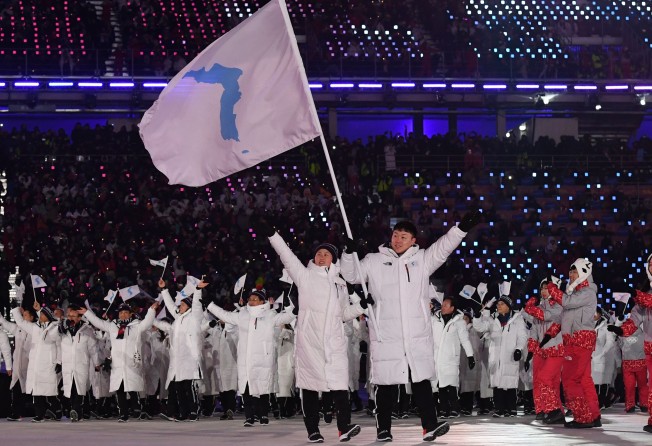Why South Korea’s Olympic overtures to Kim Jong-un will misfire in the long run
Donald Kirk says that by capitulating to most of North Korean leader Kim Jong-un’s demands before the Olympics, South Korea’s President Moon Jae-in has sent the message that he is all too willing to compromise

South Korea pushed itself to its outer limit in agreeing to its athletes marching with the North Koreans under the one-Korea flag at the opening and closing ceremonies of the Pyeongchang Winter Olympics. That’s because South Korean President Moon Jae-in sees these Olympics as an opportunity to advance his agenda of reconciliation and dialogue with North Korea. He prioritised that goal over showing off the Games as a celebration of the South as a modern nation and society. The result of this compromise was to turn the Olympics into a showcase for North Korean propaganda.
North Korean leader Kim Jong-un has played the Games for all they are worth. He had his younger sister, Kim Yo-jong, captivating the media at the opening weekend while cheerleaders, musicians, performers and taekwondo athletes starred on television. There could have been no greater public relations success for a regime that terrorises its people, keeps tens of thousands in concentration camps, orders torture and executions and, worst of all, squanders its resources on missiles and nuclear weapons while most of its 25 million citizens go hungry.
Americans have watched this display with mixed emotions. President Donald Trump made a pretence of total cooperation, refraining from criticism of the South Korean leadership. Trump had no choice. Any overt sign of unhappiness would only have provoked a firestorm of insults from America’s critics despite the doubts of millions of South Koreans about bowing to North Korea’s demands.
Probably the single most misguided aspect of North Korea’s participation was combining the North and South Korean women’s hockey sides into one team in which North Korea would have three of its players on the ice at all times. That might have been fine for exhibition games with the sole purpose of bringing North and South Koreans together but not for serious competition in which athletic skills, not political nonsense, are what counts.
One reason Moon succumbed to Kim’s charm offensive was to make sure North Korea would not pose a terrorist threat to the Games
The real insult was to the South Korean team. With the distraction of the North Korean players, the team lost all five of its games with a combined score of 28 goals to two. Those two goals, the first against Japan, the second against Sweden, were headlined as almost a triumph, but they were far from enough to compensate for the team’s dismal overall performance.
The most disturbing aspect of Kim’s charm offensive is not what it did to the Games, making them the Pyongyang rather than the Pyeongchang Olympics, but its future impact. The North Korean leader has challenged Moon by having his sister personally present a letter inviting him for a summit.
It is inconceivable that Kim will agree to abandon his nuclear programme, even if Moon goes to Pyongyang. Much more likely, he wants a deal under which the North freezes nuclear and missile tests while the South gives up joint military exercises with the US, postponed from this month to late March after the Paralympics. He will also want Moon’s cooperation in getting the UN to do away with sanctions, and he will call for the withdrawal of America’s 28,500 troops from South Korea.
Moon is probably not going to fall for all these demands. He has said he wants to wait for “the right conditions” before even accepting the invitation. The lesson from the Olympics, though, is that Moon would prefer to compromise rather than maintain a strong, steady stand against a regime with a long record of terrorism.
One reason Moon succumbed to Kim’s charm offensive was to make sure North Korea would not pose a terrorist threat to the Games. No one can forget the bombing of a Korean Air fight over the Andaman Sea 10 months before the 1988 Seoul Summer Olympics, with the loss of 115 lives.
Had Moon refused to accept the one-Korea flag, it’s unlikely that North Korea would have participated. By appearing eager for rapprochement, Moon has sought to ensure the safety of the Games and bring about improved North-South relations. In so doing, he has no doubt convinced Kim of the value of a superficial show of friendship that does nothing to get him to give up his nuclear weapons on the way to his ultimate aim of “unifying” Korea on his own terms.
Donald Kirk is the author of three books and numerous articles on Korea